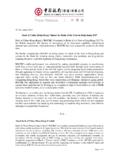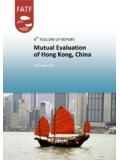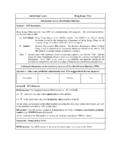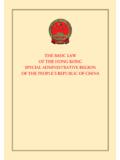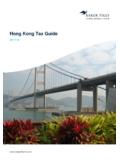Transcription of Maritime Dispute Resolution in Hong Kong A …
1 Maritime Dispute Resolution in hong KongA Practical GuideMaritime Dispute Resolution in hong KongA Practical GuideContents:1. Maritime Dispute Resolution in hong kong 32. The Rule of Law 53. Litigation 94. Arbitration 115. Mediation 156. hong kong Maritime Arbitration Clause 19 November 2014 Maritime Dispute Resolution in hong KongA Practical Guide3 Maritime Dispute Resolution in hong KongHong kong is uniquely situated in Asia, being within easy reach of more than 50% of the world s population, and being an essential region of the People s Republic of China. hong kong s location and its business friendly policies give the Maritime sector in hong kong an advantage that is hard to replicate. The breadth of international Maritime expertise in hong kong provides the Maritime industry with a multilingual Dispute Resolution center that easily fits between East and West.
2 Its empathy with the Asian traditions of mediation and its skill at blending the best of East and West have created the prime center in Asia for the Resolution of are several techniques that may be used to resolve Maritime disputes :LitigationLitigation is the act or process of bringing or contesting a legal action in court. For the purposes of Maritime Dispute Resolution , the relevant courts of justice in hong kong are the Court of Final Appeal and the High Court (which comprises the Court of Appeal and the Court of First Instance).ArbitrationArbitration is the referral of a Dispute to one or more impartial persons for final and binding determination. It is private and informal, designed for quick, practical and inexpensive Resolution of disputes .
3 However, arbitration is at the same time an orderly proceeding, whether supervised by an arbitral institution in accordance with its rules or formed as an ad hoc arbitration, in which there is no supervising institution and the parties are free to initiate and agree their own governing procedures. In any case, the conduct of the arbitration will be governed by standards prescribed by Dispute Resolution in hong KongA Practical Guide4 MediationMediation is a voluntary, non-binding, private Dispute Resolution process in which a neutral person, the mediator, helps the parties to reach their own negotiated settlement agreement. In commercial disputes , an impasse most often arises from either a lack of trust in the integrity of the other party, or a genuine good faith difference of opinion or understanding on the facts underlying the Dispute .
4 The mediator may act as a shuttle diplomat and a channel for communication, by filtering out the emotional elements and allowing the parties to concentrate on the underlying commercial objectives. The mediator has no power to impose a settlement. His/her function is to overcome any impasse and encourage the parties to reach a sensible amicable Dispute Resolution in hong KongA Practical Guide5 The Rule of LawThe principal meaning of the rule of law is that the power of the government and all of its servants shall be derived from law as expressed in legislation and the judicial decisions made by independent courts. At the heart of hong kong 's system of government lies the principle that no one, including the Chief Executive, can do an act that would otherwise constitute a legal wrong or affect a person's liberty unless he can point to a legal justification for that action.
5 It is thus fundamental that all persons, regardless of race, rank, politics or religion, are subject to the laws of the land. Further, the rule of law requires that the courts are independent of the executive. This independence is crucial if impartial rulings are to be given when the legality of acts of government falls to be restrict discretionary power, the courts have developed a set of guidelines aimed at ensuring that statutory powers are not used in ways that the legislature did not intend. These guidelines relate to both the substance and the procedures relating to the exercise of executive power. Sources of Law in hong KongNational LawSeveral national laws of the People's Republic of China apply in hong kong by virtue of Article 18 of the Basic Law.
6 Under Article 158 of the Basic Law, an interpretation of a provision of the Basic Law by the Standing Committee of the National People's Congress is to be followed by the courts of hong kong in applying the relevant Basic LawNature of the Basic LawThe Basic Law of the HKSAR was enacted by the National People's Congress in accordance with the Constitution of the People's Republic of China. It is akin to a mini-constitution for the HKSAR. It was promulgated on 4 April 1990 and took effect on 1 July 1997 on the establishment of the HKSAR. All the systems and Maritime Dispute Resolution in hong KongA Practical Guide6policies practised in the HKSAR must be based on the provisions of the Basic Law.
7 These include the social and economic systems; the system for safeguarding the fundamental rights and freedoms of its residents; the executive, legislative and judicial systems; and the relevant policies. Furthermore, no law enacted by the legislature of the HKSAR may contravene the Basic most prominent feature of the Basic Law is the underlying principle of "one country, two systems" whereby the socialist system and policies shall not be practised in the HKSAR, and the previous capitalist system and way of life is to remain unchanged for 50 the Basic Law, all the laws previously in force in hong kong (that is, the common law, rules of equity, ordinances, subordinate legislation and customary law) shall be maintained, except for any that contravene the Basic Law and subject to any amendment by the HKSAR legislature.
8 National laws of the People's Republic of China shall not be applied in the HKSAR except for a number of such laws relating to defence and foreign affairs, which are listed in Annex III to the Basic between the Central Authorities and the HKSARThe National People's Congress through the Basic Law authorises the HKSAR to exercise a high degree of autonomy directly under the Central People's Government. The HKSAR enjoys executive, legislative and independent judicial power, including that of final adjudication, in accordance with provisions of the Basic Law. Although foreign affairs relating to the HKSAR are the responsibility of the Central People's Government, the HKSAR is authorised to conduct relevant external affairs on its own in accordance with the Basic Law.
9 The Central People's Government is also responsible for the defence of the HKSAR, but the responsibility of maintaining public order in the HKSAR is a matter for its rights protected by the Basic LawThe Basic Law details the fundamental rights, freedoms and duties of the residents of the HKSAR. These rights include the right to equality before the law; freedom of speech, of the press and of publication; freedom of association, of assembly, of procession and of demonstration; and the right and freedom to form and join trade unions, and to strike; freedom of movement; freedom of conscience; and freedom of religious belief. The Basic Law also guarantees that the provisions of the International Covenant on Civil and Political Rights; of the International Covenant on Economic, Social and Cultural Rights; and of the International Labour Conventions as applied to hong kong will remain in Dispute Resolution in hong KongA Practical Guide7 The common law and the rules of equityCommon law and the rules of equity are to be found primarily in the judgments of the superior courts in hong kong and other common law jurisdictions.
10 The common law's most distinguishing hallmark is reliance on a system of case precedent, not restricted to judicial decisions generated within any single jurisdiction, but case law from all jurisdictions throughout the common law world. Article 84 of the Basic Law provides that the courts of the HKSAR may refer to the precedents of other common law jurisdictions. In addition, the Court of Final Appeal and the Judiciary of the HKSAR are given power to invite judges from other common law jurisdictions to participate in the judicial lawOver 200 international treaties and agreements have been applied to hong kong . A treaty does not constitute part of hong kong 's domestic law until given effect by legislation.
